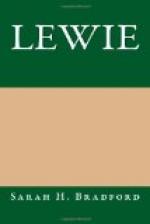To which Mrs. Elwyn replied, “How absurd, Mr. Wharton, to talk of governing a child like that!”
“There are other ways of governing, Harriet, besides the whip and the lock and key, neither of which do I approve of, except in extreme cases. Lewie could very easily be guided by the hand of love, and it rests with you now to make of him almost what you choose. A mother’s gentle hand hath mighty power.”
“Well, Mr. Wharton, to tell you the truth, nothing seems to me so absurd as all these ideas of nursery education; and the people who write books on the subject seem to think there is but one rule by which all children are to be governed.”
“I perfectly agree with you, Harriet, that it is very ridiculous to suppose that one set of rules will answer for the education of all, except, of course, so far as the Bible rule is the foundation for all government. I think the methods adopted with children should be as numerous and different as the children themselves, each one, by their constitution and disposition, requiring different treatment; but still there are some general rules, you must admit, which will serve for all. One of these is a rule of very long standing; it is this—’Honor thy father and thy mother;’ and another—’Children, obey your parents in the Lord.’ Now, how can you expect your son, as he grows up, to honor, respect, or obey you, if you take the trouble to teach him, every day and hour, that he is the master, and you only the slave of his will. There is another saying in that same old book from which these rules are drawn, which tells you that ’A child left to himself bringeth his mother to shame.’”
Mrs. Elwyn, during this conversation, kept up a series of polite little bows, but could not altogether conceal an expression of weariness, and distaste at the turn the conversation had taken. She had a sincere respect, however, for Mr. Wharton, who always exercised over her the power which a strong mind exercises over a weak one, and she felt in her heart that he was a real friend to her, and one who had the interests of herself and her children at heart.
As Mr. Wharton rose to go she said, laughingly:
“I thank you for your kind advice with regard to Lewie, Mr. Wharton, but in spite of it, I do not think I shall put him in a straight-jacket before he is out of his frocks.”
“No straight-jacket is needed, Harriet; you have often written in your copy-book at school, I suppose, ’Just as the twig is bent the tree’s inclined.’ You remember that strange apple-tree in my orchard, which the children use for a seat, it rises about a foot from the ground, and then turns and runs along for several feet horizontally, and then shoots up again to the sky. When that was a twig, your thumb and finger could have bent it straight; but now, what force could do it. If sufficient strength could be applied it might be broken, but never bent again. Excuse my plain speaking, Harriet, but I see before you so much trouble, unless that little boy’s strong will is controlled, that my conscience would not let me rest, unless I spoke honestly to you what is in my mind.”




